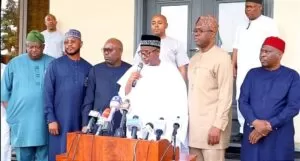INEC Officials Absent At Ighodalo’s Polling Unit

The situation regarding the absence of INEC (Independent National Electoral Commission) officials at Asue Ighodalo’s polling unit during the Edo governorship election in 2024 reflects a broader concern about electoral logistics and preparedness. Here’s a balanced overview based on the information available up to September 21, 2024:
– **Delay and Absence**: Reports indicated that INEC officials were not present at Ighodalo’s polling unit hours after the scheduled start time for voting. This delay was not isolated but part of a pattern where, in some areas, INEC officials were either late or absent, which could be attributed to logistical issues like transport breakdowns or inadequate security arrangements.
– **Logistical Challenges**: Some posts from platforms like X highlighted reasons like the absence of security personnel, which led INEC officials to delay setting up at certain locations. For instance, there were mentions of INEC officials awaiting police escort or the absence of police at polling units, suggesting that security coordination might have been part of the problem.
– **Public Sentiment**: The delay caused frustration among voters and observers, with sentiments on social media reflecting disappointment and criticism towards INEC’s management of the election process. This sentiment was not just about the physical absence of officials but also pointed towards broader systemic issues in election preparedness.
– **Electoral Integrity**: The absence of officials at key polling units, like that of a prominent candidate, raises questions about the efficiency and perhaps the integrity of the electoral process. While there’s no direct accusation of foul play, such delays can inadvertently affect voter turnout and trust in the electoral system.
– **INEC’s Response**: Although not detailed in the provided information, typically, INEC might attribute such delays to logistical challenges, weather conditions (as rain was mentioned in some reports), or security concerns. However, from the public’s perspective, these explanations might seem inadequate without clear, immediate communication from INEC.
– **Implications for Democracy**: Delays or absences like these can undermine the credibility of elections, highlighting the need for robust systems to ensure that such issues do not recur. For democracy to thrive, trust in the electoral process is crucial, and incidents like this could, if not addressed properly, erode that trust.
In conclusion, while the absence of INEC officials at Ighodalo’s polling unit might be one of many logistical hiccups during elections, it underscores the importance of efficient election management. The reaction from the public, as seen through posts on platforms like X, showcases a demand for accountability and better planning. This event could serve as a case study for INEC to review its operational strategies, ensuring that future elections run more smoothly, thereby maintaining public faith in the democratic process.







